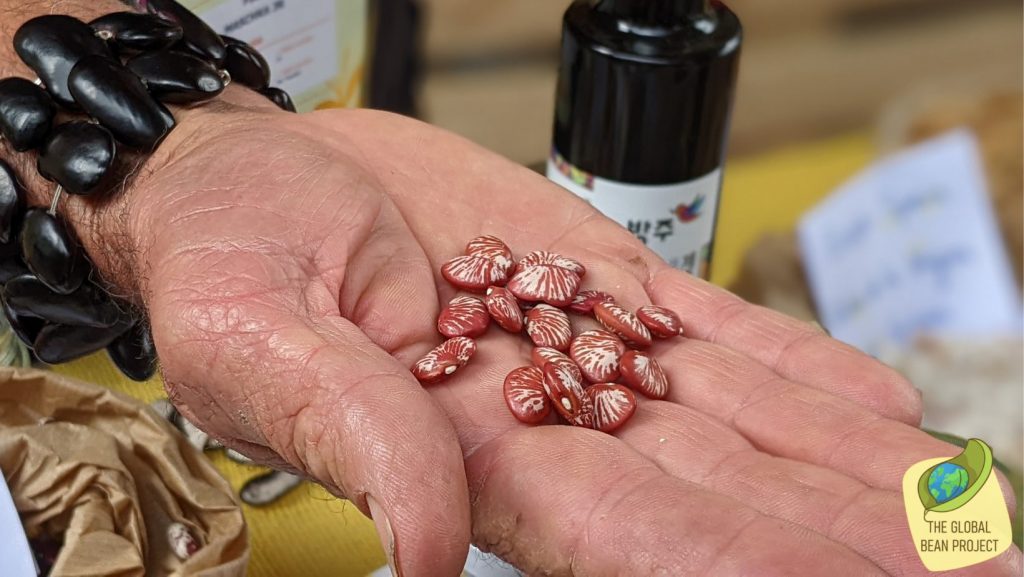Hier findet ihr Neuigkeiten rund ums Global Bean Projekt!
Die Artikel sind in “broken English”, als gemeinsame Sprache, verfasst. Für die meisten Beteiligten ist Englisch nicht die Muttersprache, also keine Angst!

March 16th: EVENT – Growing exotic legume species
Discover how to grow unknown legume species

The Fabaceae family is immense. Beans have been one of the most widely used crops for millennia, but not only beans have been used in the human diet as a source of plant protein in food. There are hundreds, possibly thousands of species that have been used in food and other diverse uses in humanity and that have fallen into a great underutilization, even being lost and being practically unknown to the majority of the population, being used in small towns or communities scattered around the globe. Many of these species can be toxic, only some parts of the plants being used like the roots, some are only used for cultural purposes, rituals as a bargaining chip.
The conservation of these species depends on our capacity to spread knowledge and promote their cultivation as much as possible. The abandonment of the use of this knowledge and species has led many of them to be catalogued as “rare“, being mostly appreciated by botanists and plant collectors, and many of them even being in danger of abandonment in their places of origin, replaced by commercial options or ancestral ignorance.
On this occasion, we will talk about some very interesting, although not necessarily “extravagant” species which can enter into this category of “exotic legumes“, discovering some curious facts, uses and their current situation.
We will also present the experiences made growing those ‘not-so-well-known’ legumes in Berlin. While many of those grain legumes originate in a tropical climate it is nonetheless possible to grow most of them successfully in a central European climate if it is only to add variety, interest and often beauty to our gardens. Some of those not yet commonly known grain legumes might even become more important in agriculture as our climate is changing.
The meeting will last one hour and will be followed by a 30-minute questions and answers session.
Please find more information and register here. For any questions please contact Lisa Hoffmann via .
We are very much looking forward to seeing you!
The Global Bean team and partners
January 6th: EVENT – Bean King/Queen Day Baking
Let’s start 2023 with GOOD LUCK! The ancient custom of the Bean King/Queen Day ends not only the dark Rough Nights, but is a beautiful feast among friends to begin the new year with lightness, sweet beans and – if you are the lucky one – even with a crown. Essential for this custom is a special cake, called “Galette des Rois” in France and “Königskuchen” in Switzerland, which we learned how to bake. Baking with beans is actually easier than you may think. Lena and Cecilia showed the most important basics with pulses as dough and as filling.
While our cakes were in the oven, we heared more of the custom from the 14th century which is still present in different ways in France, Spain, Switzerland and the South of Germany from our partners.
The baking class was animated by Dr. Lena Rutishauser (linsenlena.ch) and Cecilia Antoni (beanbeat.de).
December 13th: EVENT – Legumes in Community Catering
Do you remember eating bean soup in your canteen? It can make a difference. Passionate about getting beans onto your plate, Ottavia Pieretto, Slow Food International’s Protein Transition Project coordinator, introduced us to her bean canteen peers in Europe and beyond. Together we discussed in easy English how legumes can make a difference in public canteens around the world.
The parts of the webinar were as follows:
- 90% organic food in canteens in Copenhagen – Bettina Bergmann, Copenhagen municipality
- Improving the worst rated canteen in Tuscany – Claudia Paltrinieri, Foodinsider . Ft. Slowfood
- Actions to improve food quality – Valentina Taglietti, Meno per più
- Legumes in public health – Becky Ramsing, John Hopkins Center
- The ways of Meatless Monday – Dana Smith, Meatless Monday
- Sustainable Food Manifesto – Peter Defeanscesci, ICLEI Brussels
November 15th: EVENT – European tour of local initiatives
We discussed specific agronomic, technical and organisational issues faced by pioneers of neglected crops and how they solved them. We also focussed on the food networks that have become active around these initiatives and which make them successful: what is the nature of the collaboration with/between farmers, chefs, processors (for flour, jars, snacks, spreads, etc.), retailers, researchers? How do they engage with consumers?
We heard inspiring stories from and discussed concrete actions with:
- Constanze Bickert (Abis selection)
- Josiah Meldrum (Hodmedod’s)
- Marus Nordgren (Svensk Fava)
- Marie-Hélène Jeuffroy (INRAE)
- Nicolas Carton
October 24th: The Kbean Project in Berlin
On Thursday 20th, the Global Plot and Global bean teams were lucky to receive the KBean project form South Korea, arriving straight from the Netherlands to Berlin for a 3-day visit. >>>Read More


